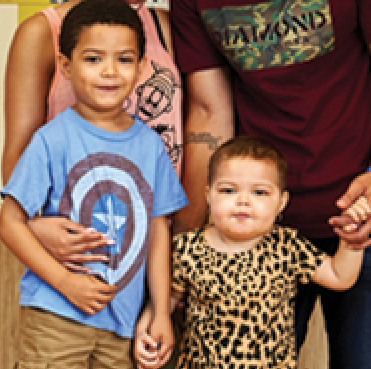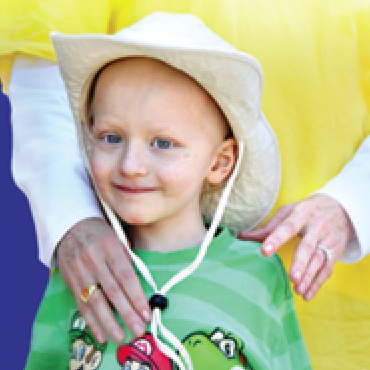 Social workers provide pediatric patients with the emotional support and expertise that comes from those who understand their needs. They can address the very natural and real fears patients face based on the individual child’s personality and where they are developmentally, whether the child is three years old or seventeen years old. Having psychosocial clinicians work through issues with patients and parents increases their level of comfort and compliance in accepting a treatment plan. And that can mean the difference between life and death.
Social workers provide pediatric patients with the emotional support and expertise that comes from those who understand their needs. They can address the very natural and real fears patients face based on the individual child’s personality and where they are developmentally, whether the child is three years old or seventeen years old. Having psychosocial clinicians work through issues with patients and parents increases their level of comfort and compliance in accepting a treatment plan. And that can mean the difference between life and death.
According to Dr. Peri Kamalakar, of Newark Beth Israel Hospital, “Based on over 30 years of experience and hundreds of children we have treated, I know that the medical treatment we doctors deliver is measurably more effective when psychosocial support is integrated with the medicine. The emotional support of people who really get to know the children and are there for the whole family when they are at their most vulnerable has a powerful effect on a child’s ability to get better.”
Certified social workers work with the family as a whole: patients, parents and families. Their overall goal is to minimize the emotional impact of the family so that parents, siblings, or others who care for the sick child are prepared and fortified to do so. Social workers help families learn to manage decisions such as whether or not a parent should stop working in order to care for the sick child; how to address the needs of the healthy siblings; or how to deal with increasing financial demands due to the child’s illness; and how to locate emergency financial aid.
These are just some of the ways social workers are able to profoundly impact a child’s journey:
1. Patient Advocacy 
Social workers keep the lines of communication open with patients’ schools and arrange for school visits to educate students and faculty about pediatric cancer or blood disorders. They advocate for families with insurance companies, step in when they encounter problems with their transportation needs, and help to locate funding sources for parents who suffer financially because of lost work time due to their child’s illness. When asked about the rewards and challenges of being a dedicated hematology social worker, Lateasha, of The Children's Hospital of New Jersey at Newark Beth Israel Hospital says, “I admire anyone who has the strength and compassion to work with children and families when they are in need and not at their fullest potential. There is nothing more gratifying than being able to ensure that hematology patients and their families have the resources needed when times are really tough. It’s extremely exciting to be able to serve as part of a team that tremendously impacts so many lives.”
2. Coordinate Services
Social worker's investigate and harness new resources and services for their patients, such as referring families to other agencies for additional services and serving as a school liaison if the hospital does not have an educational liaison. The social workers look for community agencies on behalf of patients, such as the Leukemia/Lymphoma Foundation, American Cancer Society, Make A Wish, Family Reach Foundation, and Fighting Children’s Cancer Foundation.
3. Provide Guidance
They work to ease the anxiety of the unknown associated with a new diagnosis. They provide supportive guidance to patients, parents, and extended family members as they negotiate their new medical environment. Feeling a loss of control is not unusual and the social worker aims to empower patients and their families to preserve routine as much as possible and cope within the here and now.

4. Ongoing Assessment
Making ongoing assessments of patient and family needs is an essential social work role as the patients journey through different points in their treatment experience. A social worker makes daily rounds, consults with multidisciplinary team members, meets with patients and families individually, and as a group. They put interventions into place surrounding family issues of parenting, siblings, and marital concerns. They help families balance the needs of healthy siblings versus the needs of their ill child.
5. Adminster Individualized Services
“Different diagnoses require different types of attention. Families whose child has been diagnosed with cancer are thrust into crisis mode and need help getting through that initial crisis,” explains social worker, Christina Rua. “The family of a newborn with sickle cell requires a longer process of in-depth education to help them learn how to manage a lifelong disease." Children with cancer may undergo several years of intensive treatment. Although there may be many twists and turns along the way, the typical treatment period is finite. Patients with sickle cell disease, however, are seen often from birth, throughout their entire childhood and for hospitalizations.
Overall, the social worker serves the roles of counselor/ therapist, liaison and advocate to help families meet an array of new and complex needs for their child and their entire families. Social workers are an integral member of a multidisciplinary team of medical professionals including child life specialists, doctors, and educational liaisons. Individualized care is important to help families fully grasp the impact of a diagnosis. A specialized social worker allows the families to best prepare themselves for what to expect and receive care tailored to their circumstance.









